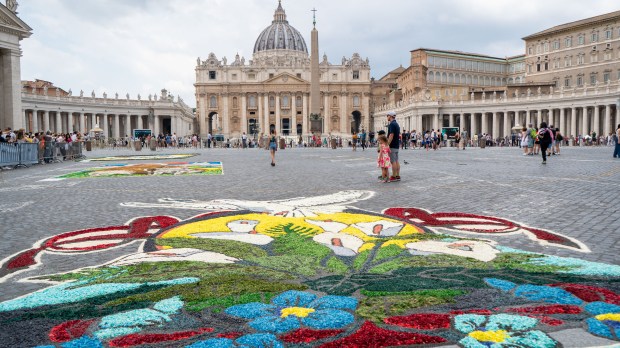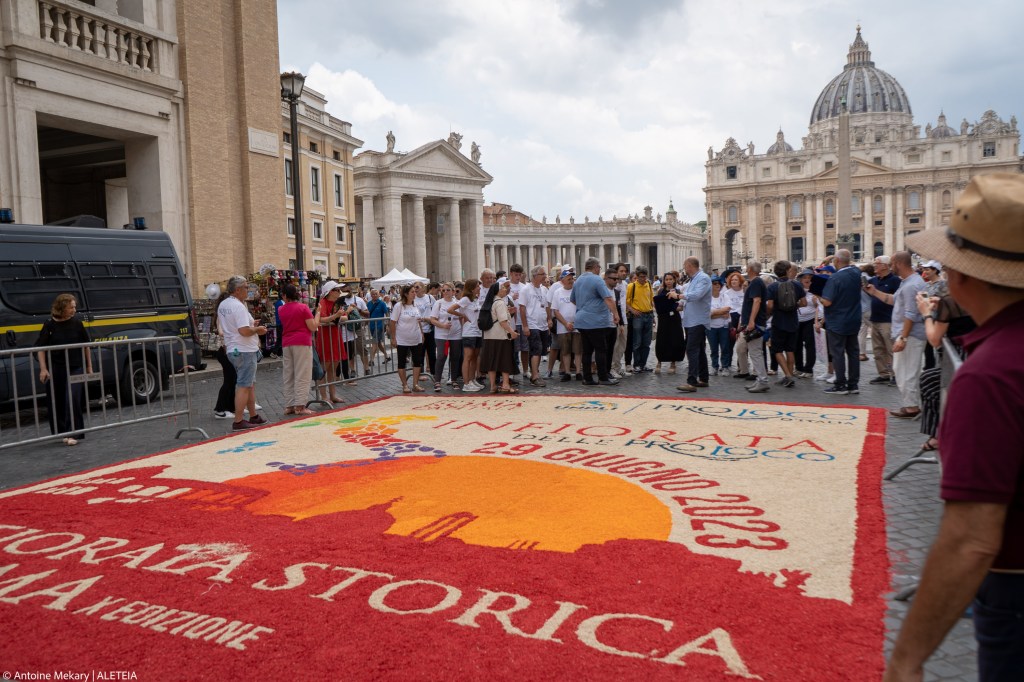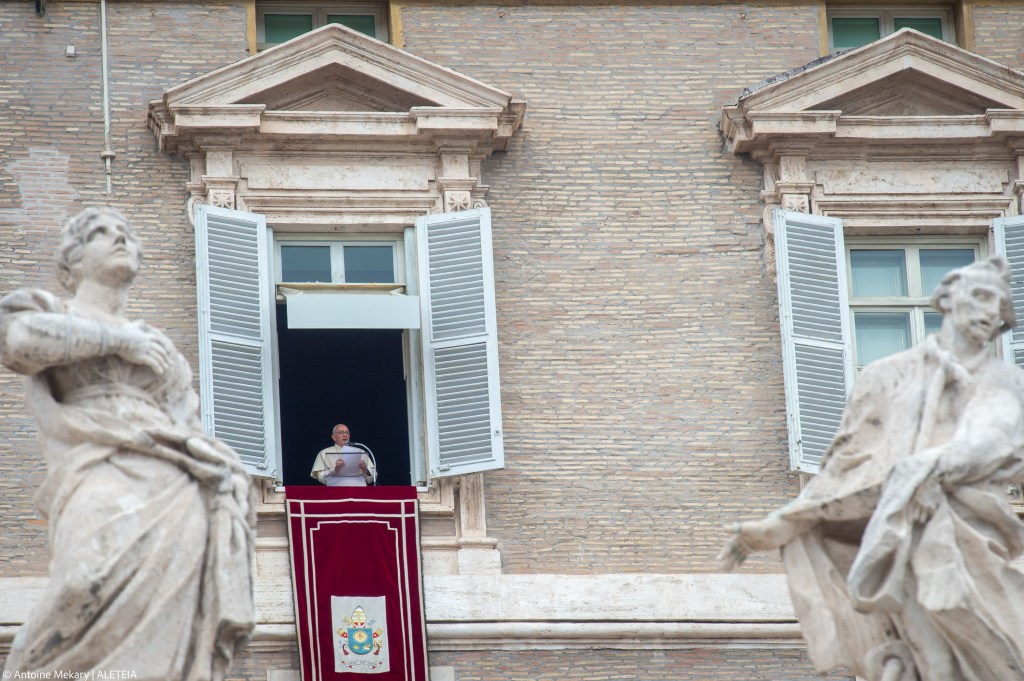Pope Francis praised the beautiful flower carpet arrangements adorning St. Peter’s Square on this feast of Sts. Peter and Paul, saying that they are a reminder to never tire of praying for peace.
After leading the midday Angelus, the Pope pointed out the creations that are part of a flower festival in its 10th year, led by various florists of Italy.
I am looking at some of the displays from here… beautiful carpets of flowers inspired by peace, and this tells us never to tire of praying for peace, especially for the Ukrainian people, who are in my heart every day.
Before the Marian prayer, Pope Francis had spoken of the faith and role of the first pope, St. Peter.
He considered three characteristics of his predecessor, symbolizing them as a rock, a stone, and a pebble (roccia, pietra, and sasso). This, he said, is because Peter is strong and steady, a support, and also little.
He is not a superman – he is a man like us, like every one of us, who says “yes” generously to Jesus in his imperfection. But it is exactly like this that – just as in Paul and in all the saints – it appears that it is God who makes Peter strong with his grace, who unites us with his love, and forgives us with his mercy. And it is with this true humanity that the Spirit forms the Church. Peter and Paul were real people. And today, more than ever, we need real people.
Here is the Holy Father’s reflection:
~
Dear brothers and sisters, buongiorno!
In the Gospel for today, the Solemnity of the Holy Apostles, Saints Peter and Paul, Jesus says to Simon, one of the Twelve: “You are Peter, and on this rock I will build my church” (Mt 16:18). Peter is a name that has several meanings: it can mean rock, stone, or simply, pebble. And, in fact, if we look at Peter’s life, we discover a bit of all three of these aspects of his name.
Peter is a rock: there are many times when he is strong and steady, genuine and generous. He leaves everything to follow Jesus (cf. Lk 5:11); he recognizes Christ, the Son of the living God (Mt 16:16); he dives into the sea to go quickly toward the Risen One (cf. Jn 21:7). Then, he boldly and courageously proclaims Jesus in the Temple, before and after being arrested and flogged (cf. Acts 3:12-26; 5:25-42). Tradition tells us also about his steadfastness when facing martyrdom, which happened right here (cf. Clement of Rome, Letter to the Corinthians, V,4).
Peter, however, is also a stone: he is a rock and also a stone, able to offer support to others – a stone that, founded on Christ, acts as a support to the brothers and sisters for the building up of the Church (cf. 1 Pt 2:4-8; Eph 2:19-22). We discover this too in his life: he responds to Jesus’s call together with Andrew, his brother, James and John (cf. Mt 4:18-22); he confirms the Apostles’ desire to follow the Lord (cf. Jn 6:68); he cares for those who suffer (cf. Acts 3:6); he promotes and encourages the communal proclamation of the Gospel (cf. Acts 15:7-11). He is “stone”, a reliable point of reference for the entire community.
Peter is a rock, he is a stone, and he is also even a pebble: his littleness emerges often. At times he does not understand what Jesus is doing (cf. Mk 8:32-33; Jn 13:6-9); when confronted with Jesus’s arrest, Peter allows fear to overtake him and denies Jesus, then repents and weeps bitterly (cf. Lk 22:54-62), but he does not find the courage to stand under the cross. He locks himself in with the others in the Upper Room out of the fear of being captured (cf. Jn 20:19). In Antioch, he is embarrassed to be with converted pagans – and Paul calls him out on this and asks him to be consistent regarding this (cf. Gal 2:11-14); in the end, according to the Quo vadis tradition, he tries to flee when faced with martyrdom, but meets Jesus on the road and regains the courage to turn back.
This is all in Peter: the strength of the rock, the reliability of the stone, and the littleness of a simple pebble. He is not a superman – he is a man like us, like every one of us, who says “yes” generously to Jesus in his imperfection. But it is exactly like this that – just as in Paul and in all the saints – it appears that it is God who makes Peter strong with his grace, who unites us with his love, and forgives us with his mercy. And it is with this true humanity that the Spirit forms the Church. Peter and Paul were real people. And today, more than ever, we need real people.
Now, let us take a look inside and ask ourselves some questions starting from the rock, from the stone and from the pebble. From the rock: Is there ardor, zeal, passion for the Lord and for the Gospel in us? Or is there something that easily crumbles? And then, are we stones, not stumbling blocks, but the kind with which the Church can be constructed? Do we work for unity, are we interested in others, especially in the weakest? Finally, thinking of the pebble: Are we aware of our littleness? And above all, in our weakness, do we entrust ourselves to the Lord who accomplishes great things through those who are humble and sincere?
May Mary, Queen of the Apostles, help us imitate the strength, the generosity and the humility of Saints Peter and Paul.
____________________________________________
After the Angelus
Dear brothers and sisters,
I address a warm greeting and special wishes to Romans, on the feast of your patron saints Peter and Paul! I thank the Pro Loco Association of Rome, which has organized the historic flower festival, created by the master florists of the various Pro Loco Associations of Italy, now in its tenth edition: I am looking at some of the displays from here… beautiful carpets of flowers inspired by peace, and this tells us never to tire of praying for peace, especially for the Ukrainian people, who are in my heart every day.
I renew my greeting to the Delegation of the Ecumenical Patriarchate of Constantinople, which has participated in today’s celebration, and I send an embrace to my dear Brother, His Holiness Bartholomew.
I greet you all, starting from the faithful who have come to celebrate with the metropolitan archbishops, for whom I blessed the Pallia this morning, and then the groups from Brazil, Croatia, Mexico, Nicaragua, Poland, the United States of America and various places in Italy.
I wish you all a happy feast day, and please, do not forget to pray for me. Enjoy your lunch, and arrivederci!



